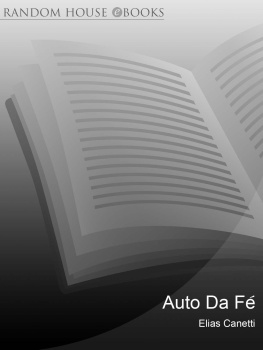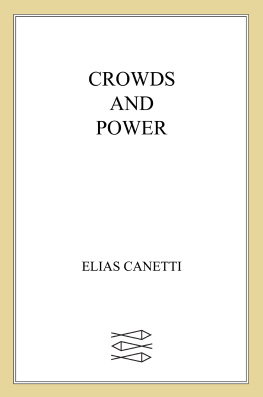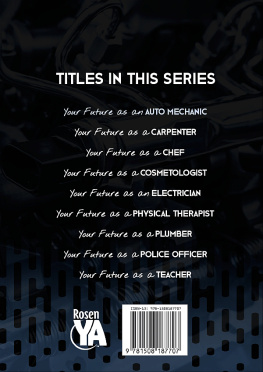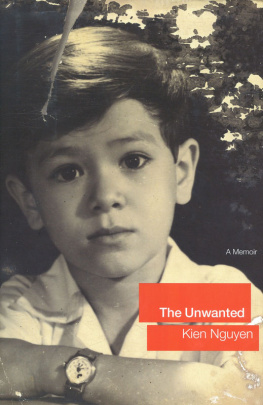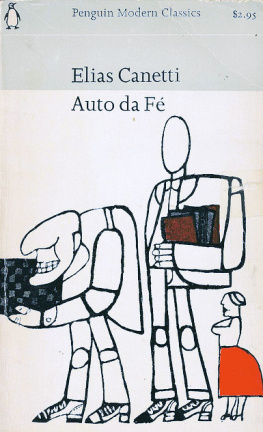
This ebook is copyright material and must not be copied, reproduced, transferred, distributed, leased, licensed or publicly performed or used in any way except as specifically permitted in writing by the publishers, as allowed under the terms and conditions under which it was purchased or as strictly permitted by applicable copyright law. Any unauthorised distribution or use of this text may be a direct infringement of the authors and publishers rights and those responsible may be liable in law accordingly.
Epub ISBN: 9781446475492
Version 1.0
www.randomhouse.co.uk
Published by The Harvill Press, 2005
2 4 6 8 10 9 7 5 3 1
Copyright Elias Canetti, 1935
English translation copyright C. V. Wedgwood, 1946
Elias Canetti has asserted his right under the Copyright,
Designs and Patents Act 1988 to be identified as the author of this work
First published with the title Die Blendung
by Herbert Reichner, Zurich, 1936
First published in Great Britain by Jonathan Cape, 1946
Random House, 20 Vauxhall Bridge Road
London SW1V 2SA
Random House Australia (Pty) Limited
20 Alfred Street, Milsons Point, Sydney,
New South Wales 2061, Australia
Random House New Zealand Limited
18 Poland Road, Glenfield,
Auckland 10, New Zealand
Random House South Africa (Pty) Limited
Endulini, 5A Jubilee Road, Parktown 2193, South Africa
The Random House Group Limited Reg. No. 954009
www.randomhouse.co.uk
A CIP catalogue record for this book is available from the British Library
ISBN 1 84343 258 7
Also by Elias Canetti and published by The Harvill Press
PARTY IN THE BLITZ
About the Book
Auto Da F is the story of Peter Kien, a distinguished, reclusive sinologist living in Germany between the wars. With a masterly precision Canetti reveals Kien's character, displaying the flawed personal relationships which ultimately lead to his destruction.
Manipulated by his illiterate and grasping housekeeper, Therese, who has tricked him into marriage, and Benedikt Pfaff, a brutish concierge, Kien is forced out of his apartment - which houses his great library and one true passion - and into the underworld of the city. In this purgatory he is guided by a chess-playing dwarf of evil propensities, until eventually he is restored to his home. But on his return he is visited by his brother, an eminent psychiatrist who, by an error of diagnosis, precipitates the final crisis ...
Auto da F was first published in Germany in 1935 as Die Blendung (The Building or Bedazzlement) and later in Britain in 1947, where the publisher noted Canetti as a 'writer of strongly individual genius, which may prove to be an influential one', an observation borne out when the author was awarded the Nobel Prize for Literature in 1981. Auto da Fe still towers as one of the greatest novels of the twentieth century, and Canetti's incisive vision of an insular man battling against the outside world is as fresh and rewarding today as when first it appeared in print.
CONTENTS
AUTO DA F
Elias Canetti
Translated from the German by C.V. Wedgwood
under the personal supervision of the author
PART ONE
A HEAD WITHOUT A WORLD
PART TWO
HEADLESS WORLD
PART THREE
THE WORLD IN THE HEAD
CHAPTER I
THE MORNING WALK
W HAT are you doing here, my little man?
Nothing.
Then why are you standing here?
Just because.
Can you read?
Oh, yes.
How old are you?
Nine and a bit.
Which would you prefer, a piece of chocolate or a book?
A book.
Indeed? Splendid! So thats your reason for standing here?
Yes.
Why didnt you say so before?
Father scolds me.
Oh. And who is your father?
Franz Metzger.
Would you like to travel to a foreign country?
Yes. To India. They have tigers there.
And where else?
To China. Theyve got a huge wall there.
Youd like to scramble over it, wouldnt you?
Its much too thick and too high. Nobody can get over it. Thats why they built it.
What a lot you know! You must have read a great deal already?
Yes. I read all the time. Father takes my books away. Id like to go to a Chinese school. They have forty thousand letters in their alphabet. You couldnt get them all into one book.
Thats only what you think.
Ive worked it out.
All the same it isnt true. Never mind the books in the window. Theyre of no value. Ive got something much better here. Wait. Ill show you. Do you know what kind of writing that is?
Chinese! Chinese!
Well, youre a clever little fellow. Had you seen a Chinese book before?
No, I guessed it.
These two characters stand for Meng Tse, the philosopher Mencius. He was a great man in China. He lived 2250 years ago and his works are still being read. Will you remember that?
Yes. I must go to school now.
Aha, so you look into the bookshop windows on your way to school? What is your name?
Franz Metzger, like my father.
And where do you live?
Twenty-four Ehrlich Strasse.
I live there too. I dont remember you.
You always look the other way when anyone passes you on the stairs. Ive known you for ages. Youre Professor Kien, but you havent a school. Mother says you arent a real Professor. But I think you are youve got a library. Our Marie says, you wouldnt believe your eyes. Shes our maid. When Im grown up Im going to have a library. With all the books there are, in every language. A Chinese one too, like yours. Now I must run.
Who wrote this book? Can you remember?
Meng Tse, the philosopher Mencius. Exactly 2250 years ago.
Excellent. You shall come and see my library one day. Tell my housekeeper Ive given you permission. I can show you pictures from India and China.
Oh good! Ill come! Of course Ill come! This afternoon?
No, no, little man. I must work this afternoon. In a week at the earliest.
Professor Peter Kien, a tall, emaciated figure, man of learning and specialist in sinology, replaced the Chinese book in the tightly packed brief case which he carried under his arm, carefully closed it and watched the clever little boy out of sight. By nature morose and sparing of his words, he was already reproaching himself for a conversation into which he had entered for no compelling reason.
It was his custom on his morning walk, between seven and eight oclock, to look into the windows of every book shop which he passed. He was thus able to assure himself, with a kind of pleasure, that smut and trash were daily gaining ground. He himself was the owner of the most important private library in the whole of this great city. He carried a minute portion of it with him wherever he went. His passion for it, the only one which he had permitted himself during a life of austere and exacting study, moved him to take special precautions. Books, even bad ones, tempted him easily into making a purchase. Fortunately the greater number of the book shops did not open until after eight oclock. Sometimes an apprentice, anxious to earn his chiefs approbation, would come earlier and wait on the doorstep for the first employee whom he would ceremoniously relieve of the latch key. Ive been waiting since seven oclock, he would exclaim, or I cant get in! So much zeal communicated itself all too easily to Kien; with an effort he would master the impulse to follow the apprentice immediately into the shop. Among the proprietors of smaller shops there were one or two early risers, who might be seen busying themselves behind their open doors from half past seven onwards. Defying these temptations, Kien tapped his own well-filled brief-case. He clasped it tightly to him, in a very particular manner which he had himself thought out, so that the greatest possible area of his body was always in contact with it. Even his ribs could feel its presence through his cheap, thin suit. His upper arm covered the whole side elevation; it fitted exactly. The lower portion of his arm supported the case from below. His outstretched fingers splayed out over every part of the flat surface to which they yearned. He privately excused himself for this exaggerated care because of the value of the contents. Should the brief case by any mischance fall to the ground, or should the lock, which he tested every morning before setting out, spring open at precisely that perilous moment, ruin would come to his priceless volumes. There was nothing he loathed more intensely than battered books.

